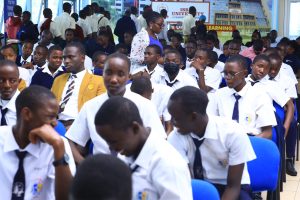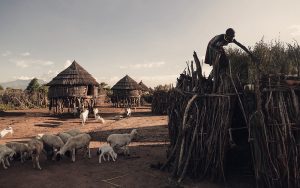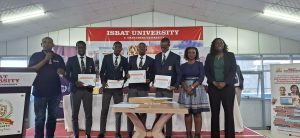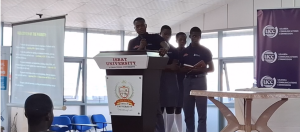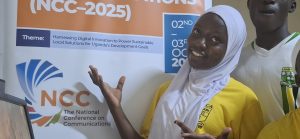The 9th National Communication Conference
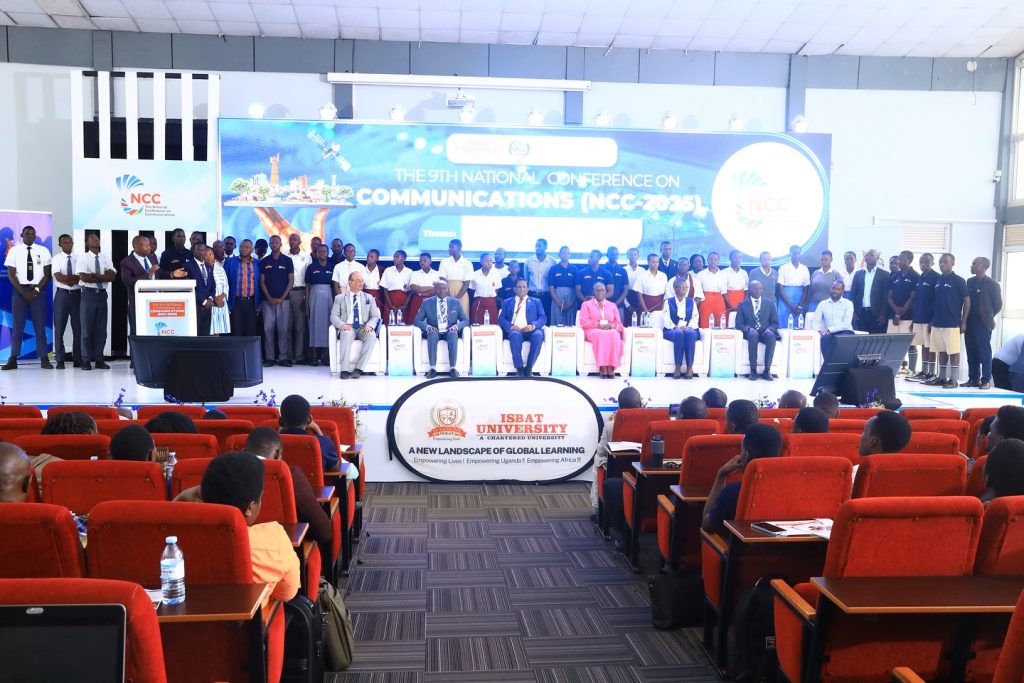
Harnessing Digital Innovation to Power Sustainable Local Solutions for Uganda’s Development Goals
The 9th National Communication Conference (NCC 2025) unfolded in Kampala from October 2nd to 3rd, 2025, marking one of the most transformative gatherings in Uganda’s ICT calendar. Convened under the theme “Harnessing Digital Innovation to Power Sustainable Local Solutions for Uganda’s Development Goals,” the conference served as a unifying platform where policymakers, innovators, scholars, educators, and students came together to reimagine Uganda’s digital future.
Organized by the Uganda Communications Commission (UCC) in collaboration with ISBAT University and the National ICT Innovation Hub (Nakawa), the conference provided a rare blend of intellectual exchange, policy dialogue, and innovation showcase. It emphasized how digital technology can drive inclusion, improve livelihoods, and accelerate national development under Vision 2040, the Digital Uganda Vision, and the National Development Plan IV (NDP IV).
🎯 Purpose and National Significance
The NCC 2025 aimed to highlight Uganda’s progress in digital transformation while identifying practical pathways for innovation-led growth. It was designed to serve as a national platform for research dissemination, networking, and solution co-creation, linking government agencies, academia, and industry stakeholders. The sessions focused on how Uganda can scale up ICT-driven development by addressing real community challenges—ranging from access to education and health to environmental sustainability and civic participation.
Through its thematic areas—Digital Innovation for Social Impact, Technology for Sustainable Livelihoods, Environmental Sustainability through Technology, Future Skills and Digital Literacy for the SDGs, and Civic Tech and Digital Governance—the conference provided space for meaningful conversations on building a more inclusive and knowledge-based economy.
🏛️ Opening Ceremony and Keynote Reflections
The conference was officially opened by the Minister for ICT and National Guidance, Hon. Dr. Chris Baryomunsi, who served as the Guest of Honour. In his keynote address, Dr. Baryomunsi applauded the Uganda Communications Commission for organizing a platform that continues to inspire collaboration and knowledge exchange within Uganda’s ICT sector.
He emphasized that the true power of innovation lies in its ability to solve everyday problems that affect citizens.
“By leveraging innovation, we can enhance service delivery, create employment, and empower communities with practical and scalable solutions tailored to local needs. Digital innovation gives us the means to address challenges in agriculture, health, education, governance, and financial inclusion—ensuring no one is left behind,”
remarked Dr. Baryomunsi.
He further urged all stakeholders to let the conference become a catalyst for actionable outcomes, strengthening Uganda’s innovation ecosystem and positioning the nation as a regional leader in digital transformation.
Other dignitaries at the opening included Eng. Christine Mugimba, Director of ICT and Research at UCC; Hon. Fred Omach Mandir, Chancellor of ISBAT University; Prof. K. M. Mathew, Vice Chancellor of ISBAT University; and Hon. Nyombi Thembo, Executive Director of UCC.
The keynote session was followed by an address by Ms. Sylvia Wairimu Mulinge, CEO of MTN Uganda, who emphasized the private sector’s role in expanding access to connectivity and supporting local innovators to create real impact.
💡 Knowledge Exchange and Thematic Discussions
Throughout the two days, the NCC 2025 featured panel discussions, paper presentations, and innovation showcases that examined the evolving role of technology in Uganda’s development agenda. Scholars, policymakers, and practitioners shared insights on unlocking social impact through digital innovation, enhancing environmental resilience using smart technology, and advancing civic tech for improved governance. The first panel discussion was moderated by Professor Pius Coxwell Achanga, vice Chancellor, Mountains of the Moon University.
Sessions were moderated by prominent academic leaders, including Professor Jude Lubega (Nkumba University), Professor Olive Sabiiti (Cavendish University), and Dr. Ronald Bakakimpa (UCC). The conversations revealed the growing synergy between academia and applied innovation, with universities emerging as active contributors to national ICT strategies.
Speakers such as Mr. Winston David Agaba (Managing Director, UBC, Mr. Arvind Kakkar (CEO, Lyca Mobile), and Mr. Nicholas Mbonimpa (CEO, RENU) called for continuous mentorship and research support for young innovators to ensure sustainability and scalability of projects beyond the classroom.
ICT Clubs Shine at NCC 2025
One of the most inspiring highlights of NCC 2025 was the National ICT Clubs Innovation Showcase, coordinated by KAWA Uganda under the UCC ICT Clubs Initiative. This session demonstrated that the country’s digital future is being shaped by creative young minds in secondary schools who are already using technology to address real-life community challenges.
The top projects from the Regional ICT Club Competitions were presented before a national audience of educators, government officials, and technology experts. The atmosphere was electric as students confidently showcased their solutions—each representing the next generation of Uganda’s problem solvers.
🥇 1st Place: Trinity College Nabbingo – YOSOIL: Smart Farming for a Sustainable Future
Trinity College Nabbingo emerged as the overall national winner with their groundbreaking innovation YOSOIL, a smart farming system designed to support sustainable agriculture among smallholder farmers. The project integrates sensors and artificial intelligence to monitor soil conditions and provide intelligent fertilizer recommendations, helping farmers improve productivity while protecting the environment.
The school was awarded UGX 3 million, while each team member—including the mentor teacher—received a high-class tablet courtesy of the Uganda Communications Commission. The innovation impressed judges for its practicality, scalability, and alignment with national food security priorities.
🥈 2nd Place: Lira Town College – LEB Lango AI Translator
In second place was Lira Town College, representing the Northern Region, with their innovative language technology project LEB Lango AI Translator. This digital tool uses artificial intelligence and natural language processing to translate text and speech between English and Lango. The innovation aims to bridge language gaps, promote inclusivity, and preserve cultural identity in Northern Uganda, where Lango is widely spoken but often underrepresented in mainstream digital spaces.
Judges described the project as a symbol of how digital innovation can serve as a bridge for social cohesion and linguistic equity in a multilingual society.
The school was awarded UGX 2 million, while each team member—including the mentor teacher—received a high-class tablet courtesy of the Uganda Communications Commission.
🥉 3rd Place: Jinja College – Q’VAULT: Enhancing Learning under the Competency-Based Curriculum (CBC)
The third-place award went to Jinja College, whose project Q’VAULT seeks to improve student learning outcomes under Uganda’s new Competency-Based Curriculum. The platform helps students access digital learning resources, track performance, and engage in interactive lessons designed to promote self-directed learning.
The school was awarded UGX 1 million, while each team member—including the mentor teacher—received a high-class tablet courtesy of the Uganda Communications Commission.
The innovation addresses the ongoing challenge of providing equitable access to educational materials in schools and leverages technology to make the CBC more learner-centred and engaging.
The ICT Clubs presentations captured the essence of Uganda’s digital transformation journey—a movement that begins in schools, grows in communities, and influences national progress.
🏆 Awards, Reflections, and Closing Ceremony
The valedictory session was a celebration of creativity, research excellence, and collaboration. Awards were presented for the Best Research Papers, Best Posters, Outstanding Innovation Demos, and Top ICT Club Projects.
In her closing remarks, Eng. Christine Mugimba praised all participants for their commitment to innovation, research, and community-focused technology. She urged institutions and private sector partners to continue supporting such initiatives that nurture local talent and bridge Uganda’s digital divide.
Delivering the Valedictory Address, Dr. Charity Basaza Mulenga, Chairperson of the UCC Board, emphasized that Uganda’s progress depends on empowering its youth, teachers, and innovators to build solutions that are both sustainable and inclusive. She called upon all stakeholders to remain committed to the Digital Uganda Vision and ensure that innovation translates into tangible impact for communities.
Conclusion
The 9th National Communication Conference (NCC 2025) stood as a powerful reminder that Uganda’s digital transformation is not a distant dream—it is happening now. Through strategic collaboration between government agencies, universities, the private sector, and schools, the nation is cultivating a new generation of innovators ready to tackle local and global challenges using technology.
From Trinity College Nabbingo’s YOSOIL, to Lira Town College’s LEB Lango AI Translator, and Jinja College’s Q’VAULT, the message was clear: the future of Uganda’s innovation lies in the hands of its young people.
NCC 2025 was more than a conference—it was a movement, a celebration of ideas, and a testament to Uganda’s unstoppable journey toward digital inclusion, sustainability, and prosperity.

